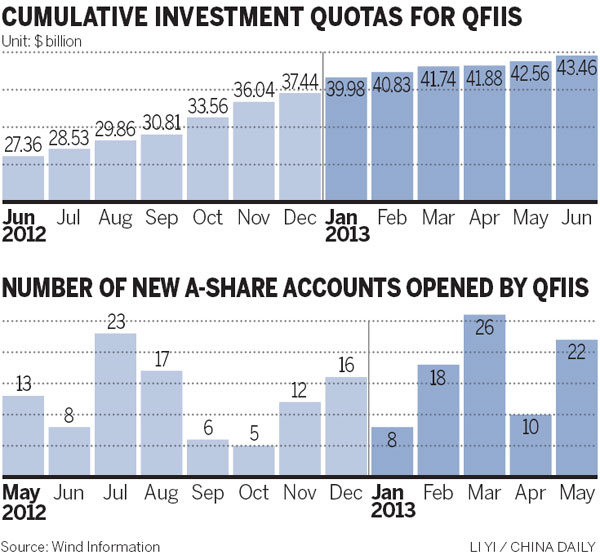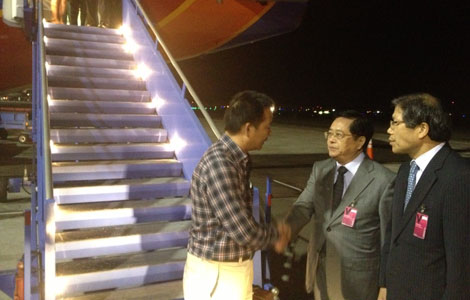QFIIs hope for expansion of program
Updated: 2013-07-10 07:17
By Wu Yiyao in Shanghai (China Daily)
|
||||||||

A decade after entering China's financial market, institutions taking part in the Qualified Foreign Institutional Investors program are increasingly interested in the nation's stock market, which they hope will further expand.
Analysts said although QFII capital has not been significant enough to have an obvious impact on the market, expanding QFII quotas could change the picture of the A-share market.
QFII investors own about only 1 percent of the free float in the mainland's equity market. But if the QFII program expands, it might have bigger impact, said Zhang Qi, an analyst with Haitong Securities Co Ltd.
QFIIs usually focus on long-term investment and value growth. Despite the sluggish performance of the A-share market in recent years, QFIIs have achieved positive yields, Zhang said.
According to the State Administration of Foreign Exchange, the combined assets of QFII accounts have reached 265.6 billion yuan ($43 billion), of which 144.3 billion yuan represents returns since they started operation in 2003 under the approval of the State Administration of Foreign Exchange.
Chinese regulators have made a series of decisions to open up the mainland financial markets to QFIIs, such as increasing the total quota limit for the program, relaxing QFII qualification requirements and speeding up the application and licensing process.
As of the end of June, at least 207 QFIIs were operating in China with a combined approved quota of $43.5 billion. The current ceiling on combined QFII quotas has reached $80 billion.
The allocation procedure and the process of granting permission for the withdrawal of funds both need to become much simpler and faster to attract massive new foreign flows, according to Dariusz Kowalczyk, a Hong Kong-based economist and strategist at Credit Agricole CIB.
Kowalczyk said a substantial increase in QFII and Renminbi Qualified Foreign Institutional Investor quotas for foreign investors in mainland markets for portfolio assets is expected.
"The increasing number of QFII plays in the A-share market may add to the complexity of the market, which is largely driven by speculators who chase short-term trends with little regard for stock valuations," said Wan Lei, analyst with CITIC Securities Co Ltd.
With more QFIIs, the market can become more sophisticated, with professional research and investment techniques, said Wan.
"My observation is that most of the QFIIs favor long-term investment, and their investment focuses on certain industries such as banking and research-oriented investment strategies that can be implemented," said Wan.

 Breathe deep, this is the real thing
Breathe deep, this is the real thing
 Families of crash victims in SF
Families of crash victims in SF
 Rainstorms cause severe flooding and landslides
Rainstorms cause severe flooding and landslides
 Coal burning in China's north can shorten lives
Coal burning in China's north can shorten lives
 Some solar companies see brighter first half
Some solar companies see brighter first half
 Thousands flock to Texas Capitol over abortion
Thousands flock to Texas Capitol over abortion
 China's youngest city glistens under palm trees
China's youngest city glistens under palm trees
 Xinjiang tourism recovering
Xinjiang tourism recovering
Most Viewed
Editor's Picks

|

|

|

|

|

|
Today's Top News
China, US hold talks on cybersecurity
Shenzhen Red Cross denies organ claim
Security in cyberspace 'still major problem'
Rainstorms cause severe flooding and landslides
Japan tags China as 'security threat'
Honesty is a challenge for CPC
Snowden hasn't accepted asylum
Teenage girls were best friends
US Weekly

|

|







